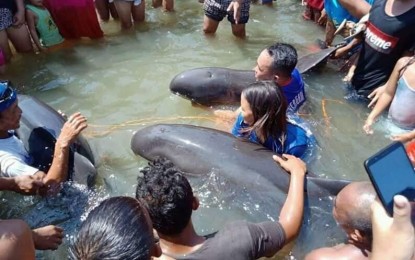
BEACHED WHALES. Residents of Hinigaran, Negros Occidental take photos with the three melon-headed whales stranded in the coastline of the southern Negros town on May 24, 2019. A viral video of the incident raised concerned among conservationists on the public’s lack of awareness in handling beached marine animals. (Photo by F. Tingson/Lumba Project Facebook page)
BACOLOD CITY -- Marine wildlife conservation groups in Negros Occidental have underscored the need to educate and raise the awareness of Negrenses on the proper response for stranded marine animals.
Mark de la Paz, a trainer at Negros Occidental Marine Wildlife Responders, raised the concern on Tuesday after watching a viral video showing residents of Gargato village in Hinigaran town having a “photo opportunity” with three stranded melon-headed whales.
De la Paz, whose network of responders trains people in collecting data, responding and rescuing marine wildlife, said the act showed the lack of awareness on the part of the community, especially on how to ensure the safety of stranded marine animals.
He noted that touching the whales could bring additional stress and inflict injuries to the animals.
“We take this as an opportunity to educate them,” said De la Paz, who is also a research associate at the Center for Research and Engagement of the University of Saint La Salle here.
“In this kind of situation, residents should not make contact with animals as these might also have diseases that could infect people,” he added.
Lumba Project, a group working for the conservation and protection of endangered Irrawaddy dolphins, said on Facebook that what the residents did was not the proper way to handle stranded whales.
“Crowds must be kept far from them to minimize stress and transmission of zoonotic diseases,” the group said, adding that people should also stay clear of the tail and avoid unnecessary contact.
Liezl Namo, head of Hinigaran municipal environment office, said the “photo opportunity” happened before their personnel arrived to rescue the animals.
She said they received the report on the stranded whales around 10:15 a.m. on May 24 after fishermen saw the animals in the shoreline of Sitio Ambacan.
“It was like a fiesta when we arrived as residents were rejoicing. It was hard for us to control the crowd. They don’t know that what they are doing is wrong,” Namo said.
“We warned them to never make fun of the stranded whales,” she added.
Namo said they checked the melon-headed whales, which did not have injuries, before releasing them back to the sea.
According to the Provincial Environment Management Office here, the beaching of the melon-headed whales in Hinigaran was the first recorded appearance of the species in Guimaras Strait and in the Negros Occidental Coastal Wetlands Conservation Area.
It added that melon-headed whales “are very social animals and are sometimes associated with other oceanic dolphins such as killer whales, pilot whales, false and pygmy killer whales, and Risso’s dolphins.” (PNA)
